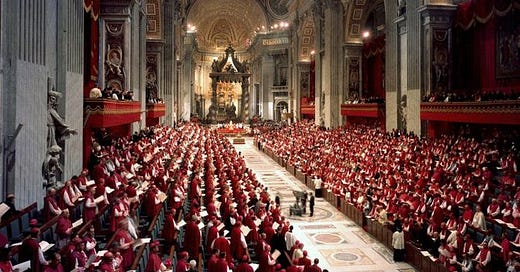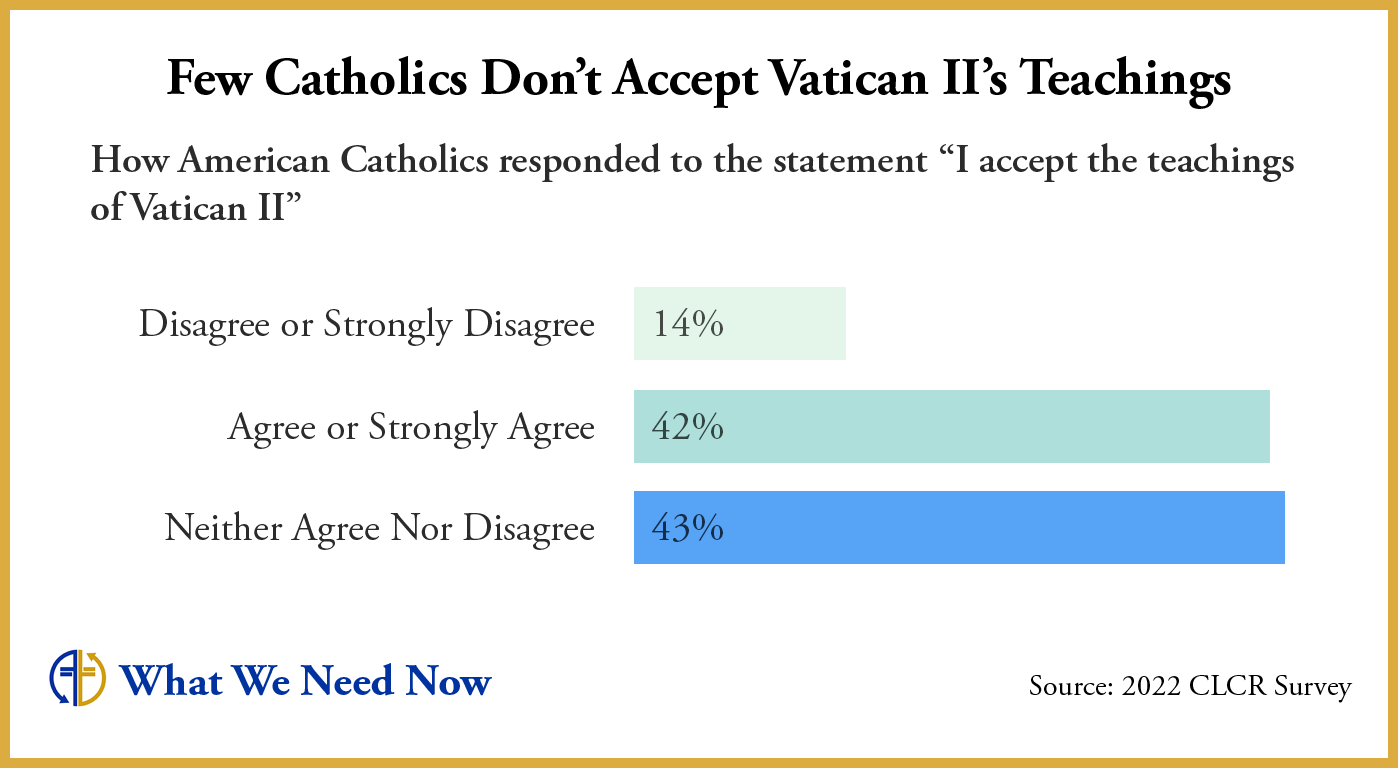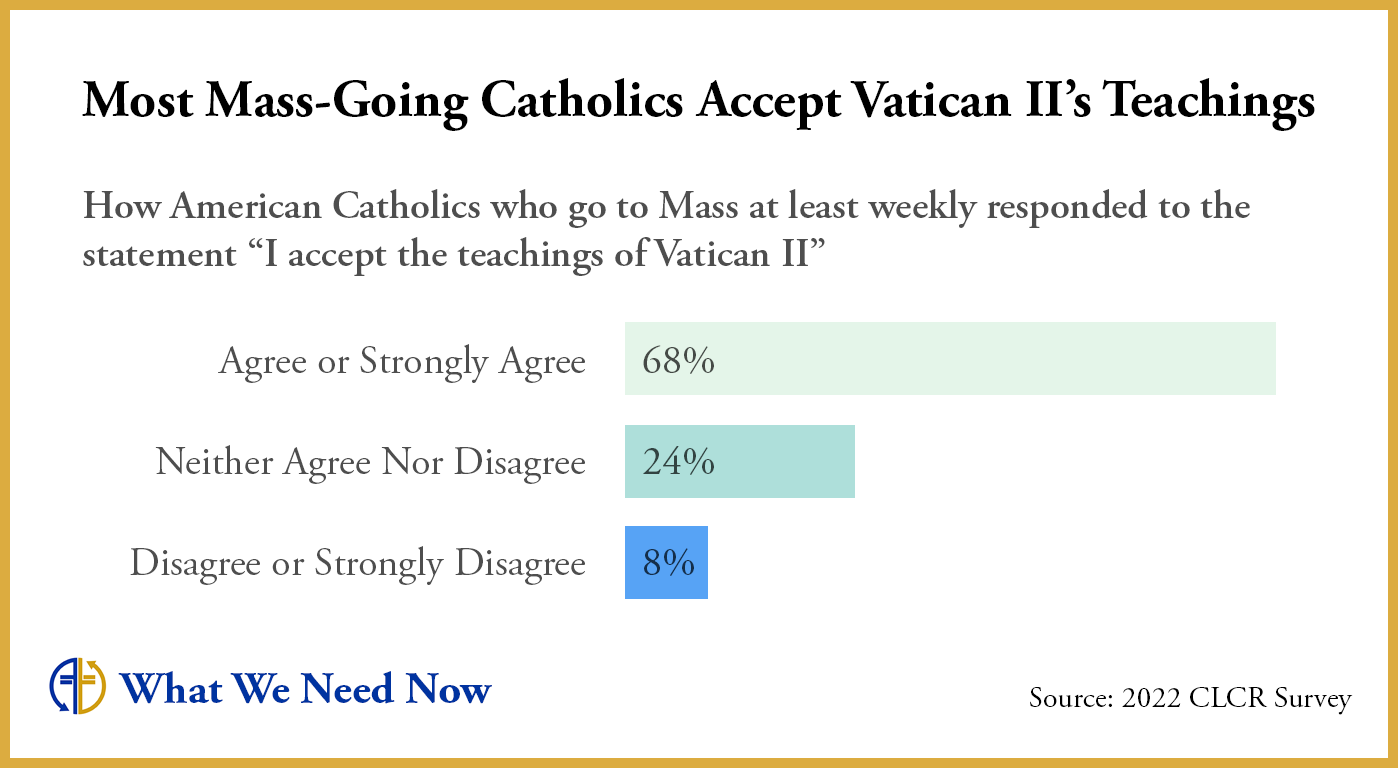It is often claimed that Americans have rejected either some of the teachings of Vatican II or the Council whole cloth. In the words of Massimo Faggioli, for instance, “There is a parallel between the rejection of Vatican II and the relationship between the church in the United States and Pope Francis. The opposition to Pope Francis is rooted in the opposition to Vatican II.”1 Even Pope Francis famously stated his fear that the United States was a hotbed of anti-Vatican II sentiment, claiming there are a “significant” number of “restorers” in America.2 (Elsewhere I make the argument that the Holy Father’s comments betray a lack of understanding of the Church in the United States, but the purpose of this essay is to bring empirical data to the question.)
The narrative that many Americans reject Vatican II is used to justify a host of actions, from suppressing the Traditional Latin Mass (because of the “backwardness”3 of its participants), to trying to “balance” the American episcopate (see the list of U.S. delegates appointed to the Synod on Synodality as a recent example) and limit its influence with the unsubstantiated claims that many U.S. bishops reject Pope Francis’ agenda. Even some U.S. bishops have argued that many of their brother bishops reject the Holy Father’s priorities.4
Although there are unquestionably some groups, albeit small in number, that vocally reject Vatican II, we were interested in surveying Catholics to see what the rank-and-file laity actually believe. And so last year Catholic Laity and Clergy for Renewal conducted a national survey of Catholic laity about different issues facing the Church. The self-weighted survey was conducted using the Momentive/SurveyMonkey panel, filtering for self-identified Catholics. (Survey panels are pre-selected groups of people who are paid to take surveys, and their use has been shown to have comparable results with more traditional methods.) This survey was conducted on June 21, 2022 and surveyed 1,033 Catholics.
In preparing the survey, we recognized that asking questions about attitudes toward Vatican II would be difficult, given that religious knowledge about Catholic doctrine generally is sorely lacking. For example, only about half of Catholics in the United States know that the Church teaches that “during Communion, the bread and wine actually become the body and blood of Christ. The other half of Catholics incorrectly say the church teaches that the bread and wine used in Communion are just symbols of the body and blood of Christ (45%) or say they are not sure (4%).”5
When Catholics in the US lack such basic knowledge about a topic as vitally important as the Church’s teaching about the Eucharist, how can we expect reliable answers about something more esoteric, like Vatican II? Therefore, we decided to start with an open-ended question, asking them to name an issue—any issue—addressed by Vatican II: “What is a major issue addressed by Vatican II?” Afterwards we went through the responses and coded them a 1 if they accurately communicated an issue that was addressed by Vatican II—no matter how basic—and a 0 if they either could not or tried but did not accurately respond.
Only 17% of respondents could correctly articulate a single issue addressed by Vatican II, most frequently citing the vernacular Mass and ecumenism. The most common wrong answer was the sexual abuse crisis, but most recipients didn’t even venture a guess.
Additionally, when we asked a question about “which was the most recent Church Council” with options of:
“Council of Rome” (not a real council)
“Council of Trent” (convened in the 16th century)
“Vatican I” (convened in the 19th century)
“Vatican II” (the correct answer)
“Vatican III” (not a real council)
Only about half correctly answered “Vatican II.”
Regardless, about a quarter of people who could not articulate an issue addressed by Vatican II still indicated that they were “familiar with the teachings laid out in the documents of Vatican II” (for those who accurately articulated a Vatican II issue, this number was 59%, indicating that many weren’t confident in their knowledge). Therefore, when considering whether American Catholics support Vatican II, we must begin with the fact that hardly any of them actually know what it taught.
Excluding those who responded they “didn’t know,” what did the survey show? 85% of respondents did not disagree with the statement, “I accept the teachings of Vatican II.”
When only looking at Catholics who attend Mass “nearly every week” or more an even smaller percentage disagree with Vatican II’s teachings. A whopping 92% of respondents were neutral or favorable toward the statement, “I accept the teachings of Vatican II.” This flatly contradicts the narrative of “significant” numbers of ultra-traditional American Catholics rejecting Vatican II.
In a similar vein, when we only look at those who were able to articulate a major issue addressed by Vatican II, only 8% of respondents admitted some hesitancy in accepting the teachings of Vatican II—hardly supportive of the notion that America is teeming with Catholics who reject the Council.
Why are Mass-going Catholics more supportive of the Council than non-Mass going Catholics? This goes beyond the purview of the survey, but it seems feasible that since the latter are largely ignorant of the Council, they were likely voicing disagreement with Church teaching associated with that era, such as Humanae Vitae. It is also possible the survey caught some of the few Catholics who reject both the Council and the Novus Ordo and, instead of finding a Traditional Latin Mass, stopped going to Mass.
How did respondents view the impact of Vatican II? 44% of those surveyed agreed to some extent with the statement that “Vatican II was beneficial for the Church.” On the flipside, 13% of respondents disagreed to some extent, but for the knowledgeable group it was only 9%. On the question of whether “the teachings of Vatican II are an authentic development of the Church’s teaching” those who disagreed were 10% and 8%, respectively. This suggests, interestingly, that those who weren’t knowledgeable about Vatican II were somewhat less supportive of it. But overall, it appears that the percent of Catholics who know anything about what Vatican II taught, who also evince some discomfort with Vatican II teachings, are in the single digits.
Additionally, most Catholics are satisfied that their own diocese is implementing the Vatican II reforms, with only 3% of knowledgeable respondents disagreeing to some extent with the statement that “the teachings of Vatican II have been implemented in my diocese.”
We also investigated which Catholics felt hesitancy about Vatican II. We used a statistical method known as multiple regression analysis that “controls” for other characteristics. For example, if, say, older people tend to be more religious, then we can isolate the effect of religion while holding age equal. When we do this while controlling for income, age, gender, and region of the country, both self-identified theological conservativism and Mass attendance frequency was related to supporting Vatican II. However, when we only looked at the people who knew something about Vatican II, church attendance (but not self-rated conservativism) was positively related to Vatican II support. In other words, even among those who knew something about Vatican II, people who attended church more agreed with Vatican II more.
Finally, we compared opinions of Pope Francis and rejection of Vatican II, to see if Faggioli is correct that “opposition to Pope Francis is rooted in the opposition to Vatican II.” While we did find a statistically significant relationship between unfavourability towards Pope Francis and disagreeing with the statement "I accept the teachings of Vatican II,” the numbers involved are quite small, with only 5% of respondents who could articulate anything accurate about Vatican II falling in the category of unfavorable towards Pope Francis and not accepting the teachings of Vatican II to some degree (for all Catholics who could articulate something about Vatican II—including those who are favorable towards Pope Francis—this number is 8%). Even among all Catholics who are unfavorable towards Pope Francis, a strong majority (70%) do not disagree with the teachings of Vatican II.
What’s the takeaway from this survey? U.S. Catholics, and especially those who are practicing, have not rejected Vatican II. The majority of them are ignorant of it, but even then, many more maintained they support the Council’s teachings than reject them. Furthermore, the fact that practically every Roman Catholic attends the Novus Ordo and is involved in the Church via a non-TLM parish is indication that Vatican II has not been rejected. This is true for bishops as well. There is no evidence that a single bishop in the U.S. has rejected Vatican II. The premise then for claims that the Catholic Church in America is anti-Vatican II is unfounded, and we hope this will begin to correct the errant narrative that has persisted for so long.
Jayd Henricks is the president of Catholic Laity and Clergy for Renewal. He served at the U.S. Conference of Catholic Bishops for eleven years and holds a STL in systematic theology from the Dominican House of Studies. He has written extensively on the Church in America.
Statistical analysis for this article was provided by Stephen Cranney, a data scientist in the Washington, DC area and a non-resident Fellow at Baylor's Institute for the Studies of Religion who has published over 20 peer-reviewed studies. His research has been reported on by The Guardian, Deseret News, The Wall Street Journal, The Atlantic, and Christianity Today.
Massimo Faggioli, “Opposition to Pope Francis is rooted in a rejection of Vatican II,” April 4, 2022, National Catholic Reporter.
In his words: “Restorationism has come to gag the Council. The number of groups of ‘restorers’ – for example, in the United States there are many – is significant.” See “Pope Francis in Conversation with the Editors of European Jesuit Journals,” June 14, 2022, La Civiltà Cattolica.
Hannah Brockhaus, “Pope Francis says traditional Latin Mass was being used in an ideological way,” May 9, 2023, Catholic News Agency.
Jayd Henricks, “Letter to the Editor: Correcting a common misconception about the U.S.C.C.B,” November 26, 2022, America.
See “What Americans Know About Religion,” Pew Research Center.







